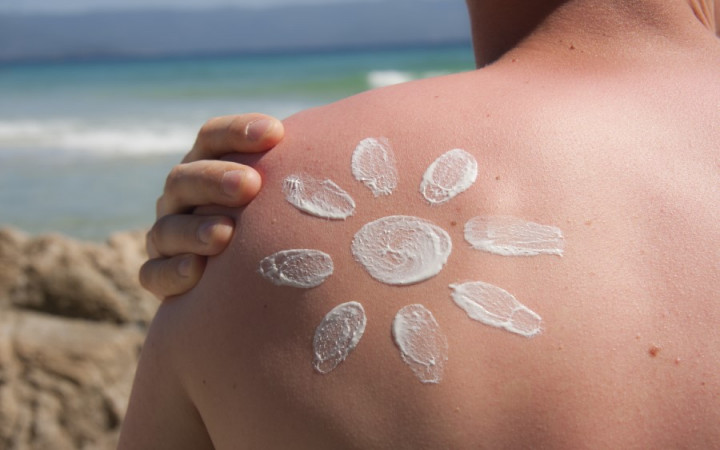Woo hoo! It's summer and you've finally made your way to the beach. You can't wait to build sand castles and play in the water. But first, there's something you must do. In fact, you've probably been reminded hundreds of times: put on sunscreen!
If you've ever had a sunburn, you know how important it is to apply sunscreen before spending a significant amount of time outside. Although the Sun's rays might feel good while you're basking in them, that pleasure can quickly turn to pain if your skin is unprotected and gets burned by the Sun.
Most people have experienced a sunburn at least once. Many people have experienced them several times. When you get a sunburn, you know it! Your skin turns red and might even blister. It's sore and can be downright painful. In fact, it can hurt a lot when you move…and when you're not moving!
Many people love to soak up the Sun's rays and let them turn their skin golden brown. Many people work hard to avoid sunburn while still achieving the bronze shade of skin they love to sport in the summer. That suntanned skin doesn't come without a price, though.
While many people love the look of golden brown skin, the Sun's ultraviolet rays that turn their skin from white to bronze also cause wrinkles, age spots, and other signs we usually associate with the aging process. Worse yet, tanned skin — whether it's from the Sun or a tanning booth — also increases the risk of developing skin cancer.
When you're basking in the Sun's rays, those rays — known as ultraviolet (UV) light — damage your skin. Over time, they break down fibers in the skin known as elastin. This causes your skin to sag and stretch, which are both signs of aging.
Exposure to ultraviolet light also can cause your skin to bruise and tear more easily. Another risk is that ultraviolet rays can damage your skin's natural immune function, which can lead to the formation of cancerous skin lesions.
Skin cancer is the most common type of cancer in the United States. Each year, the number of cases of skin cancer continues to rise. Skin cancer is the uncontrolled growth of abnormal skin cells, which results in the formation of a tumor.
The three types of skin cancer that have been linked to ultraviolet light exposure are basal cell carcinoma, squamous cell carcinoma, and melanoma. Of these types of skin cancer, basal cell and squamous cell are less serious, and fortunately account for about 95% of all skin cancers. When identified and treated early, these types are highly curable.
Melanoma, on the other hand, is much more serious. Made up of abnormal skin pigment cells called melanocytes, melanomas cause three out of every four skin cancer deaths. If not treated promptly, melanoma can spread to other areas of the body and quickly become difficult to control or treat.
The Sun's ultraviolet radiation has been identified as the primary cause of skin cancer, and ultraviolet light from tanning beds is equally dangerous. The cumulative exposure to sunlight over the years usually leads to basal cell and squamous cell skin cancers. Melanoma, however, has been linked to episodes of severe sunburn early in life.
Anyone can get skin cancer. However, scientists have learned that people who get sunburned easily, such as those with fair skin, light eyes, and blond or red hair, are at a much higher risk than those with darker skin. Other risk factors include working outdoors and living in a sunny climate.
There are steps you can take, though, to help minimize your risk for skin cancer. Although nothing can undo damage from the Sun's rays, the skin is resilient and can sometimes repair itself. It's never too late to take good care of your skin!
As a general rule, apply sunscreen to your skin when you know you're going to be getting a lot of sunshine or UV rays. Remember, you can get a sunburn even when it's cloudy. It's best to check the UV Index number and plan accordingly.
Doctors recommend using a sunscreen with a sun protection factor (SPF) of at least 30 at least a half-hour before exposure to the Sun's rays and every two hours afterward. If you're sweating a lot or swimming, you need to reapply sunscreen more frequently.
It also helps to reduce your overall exposure to sunlight, especially during peak ultraviolet radiation hours (approximately 10 a.m. to 2 p.m.). Wear clothing and sunglasses that help block the Sun's rays whenever possible. Take good care of your skin and it will continue to take good care of you!




